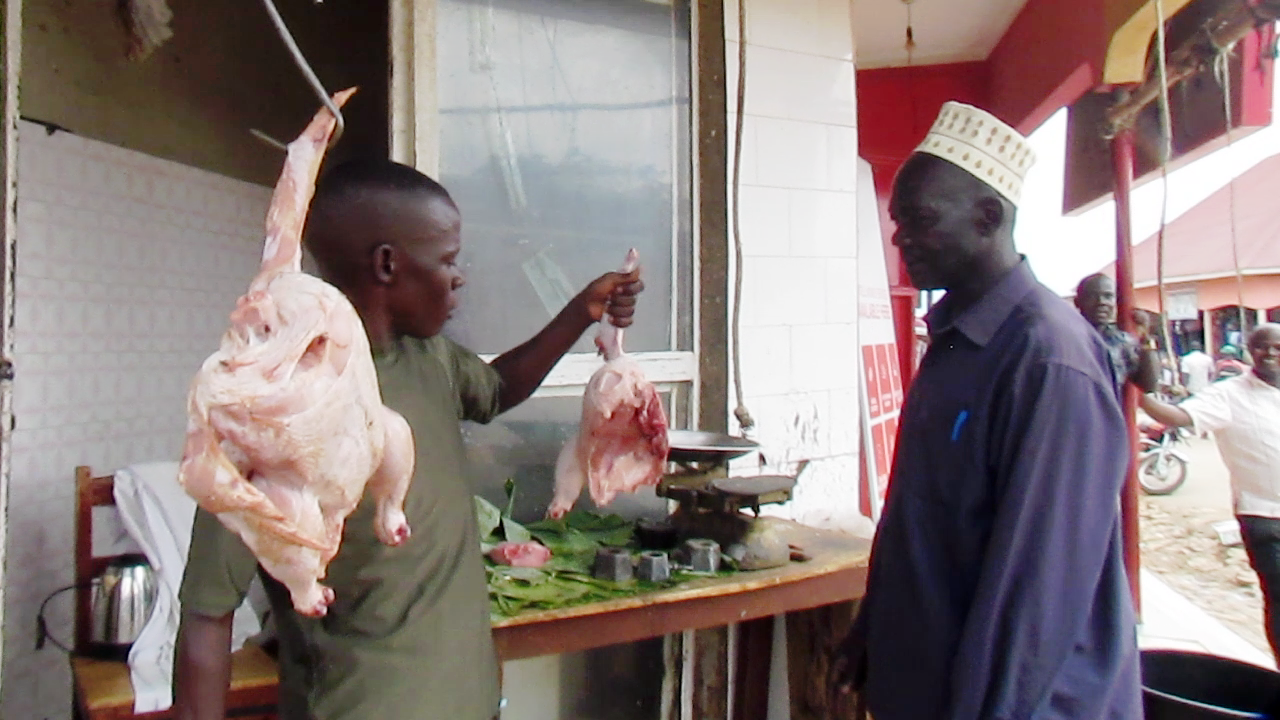KYOTERA, December 13, 2023 – The prices for live chicken and related meat have gone up in Kyotera district after authorities imposed a two-month quarantine on livestock and beef trade, aimed at stopping the spread of anthrax in the district.
A kilogramme of chicken meat in Kyotera town council now costs Shs 17,000 from Shs 10,000 and a live chicken weighing 3kg is sold at Shs 50,000 from Shs 20,000, following an outbreak of anthrax that claimed the lives of 17 people since September this year.
Muhammed Batte, a butcher in Kyotera town council said he has switched to selling chicken though customers are very scarce. ‘’Selling chicken is a challenging job because a chicken that weighs 3kg is sold at Shs 50.000 by local farmers and yet we sell a kilogramme of chicken meat at Shs 17,000,’’ he said.
Early this month, authorities in Kyotera district employed tough preventive approaches in a bid to stop the spread of anthrax to other parts of the country and they approved chicken as the only alternative animal product whose meat is safe for human consumption during the quarantine period.
Kyotera Resident District Commissioner [RDC] Apollo Mugume has advised people in the district to eat chicken poultry meat until the quarantine is lifted.
Kyotera District Health Officer, Dr. Edward Muwanga said anthrax is caused by spore-forming bacteria and is sometimes associated with the weaponized version used in the 2001 attacks in the United States, when five people died and 17 others fell sick after being exposed to anthrax spores in letters sent through the mail.
Anthrax usually affects livestock like cattle, sheep, and goats, as well as wild herbivores. Humans can be infected if they are exposed to animals or contaminated animal products. Anthrax isn’t generally considered to be contagious between humans, although there have been rare cases of person-to-person transmission, WHO says.
Anthrax bacteria also occurs naturally in soil.
He said the teams of medical doctors, veterinary officers and security organs led by RDC Mugume have conducted sensitisation meetings in the whole district, educating residents on the preventive measures against anthrax.
He said people suspected to have been infected by the disease were taken to Kalisizo Hospital for treatment, even though he added that eight patients were treated and got cured of the disease and are now back in the community.
Mugume explained that security has put road blocks on all access roads in the district to deter those who transport milk and those who move long distances with herds of cattle to look for water and pasture. “We have deployed our intelligence in all villages to ensure that there is no slaughtering of animals for beef and no selling of milk and whoever is found doing so will be arrested,” he said.
Rose Namakula a resident of Kabira said chicken is very expensive and a kg of chicken is not enough for her family members and she will be forced to feed her family with beans, greens or ground nuts during the Christmas season.
Meanwhile, Joseph Kagame a dairy farmer at Bukaala village in Kabira Sub-county said the prices of milk have gone down from Shs 1,200 to Shs 700 per litre because of low demand arising from fear of catching anthrax. ’’We are livestock farmers in Kabira Sub-county and our source of income is cattle, where can we get money to sustain our families’’ he said.
Meanwhile, the World Health Organisation [WHO] reported on Monday that five countries in East and southern Africa are in the middle of outbreaks of the anthrax disease, with more than 1,100 suspected cases and 20 deaths this year, the World Health Organization said Monday.
A total of 1,166 suspected cases had been reported in Kenya, Malawi, Uganda, Zambia and Zimbabwe. 37 cases had been confirmed by laboratory tests, according to the WHO, which also said the five countries have seasonal outbreaks every year, but Zambia was experiencing its worst since 2011 and Malawi reported its first human case this year. Uganda had reported 13 deaths.
In a separate assessment of the Zambia outbreak, which was the most concerning, WHO said that 684 suspected cases had been reported in the southern African nation as of November 20, with four deaths. Human cases of anthrax had been reported in nine out of Zambia’s 10 provinces. In one instance, 26 people were suspected of contracting the disease from eating contaminated hippopotamus meat.
WHO said there was a high risk that the Zambian outbreak would spread to neighboring countries.
The outbreaks in all five countries were “likely being driven by multiple factors, including climatic shocks, food insecurity, low-risk perception and exposure to the disease through handling the meat of infected animals,” the WHO said.
https://thecooperator.news/quarantine-in-kyotera-as-anthrax-hits/
Buy your copy of thecooperator magazine from one of our country-wide vending points or an e-copy on emag.thecooperator.news
